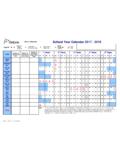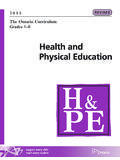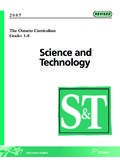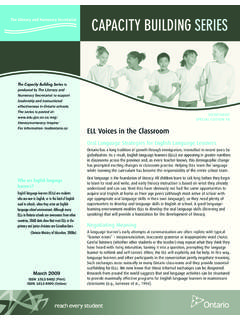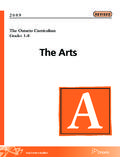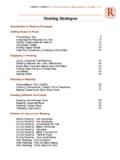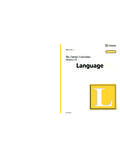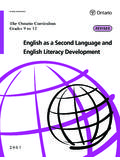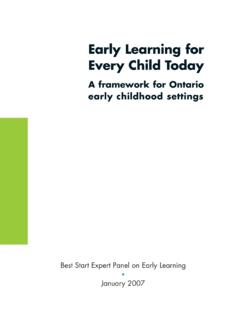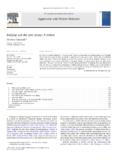Transcription of Grades1-8 - Ontario
1 Ministry of Education REVISED. The Ontario curriculum grades 1 -8. Mathematics Printed on recycled paper 04-163. ISBN 0-7794-8122-4. Queen's Printer for Ontario , 2005. 2005 ISBN 0-7794-8121-6 (Print). ISBN 0-7794-8122-4 (Internet). Contents Introduction .. 3. The Importance of Mathematics .. 3. Principles Underlying the Ontario Mathematics curriculum .. 3. Roles and Responsibilities in Mathematics Education .. 4. The Program in Mathematics .. 7. curriculum Expectations .. 7. Strands in the Mathematics curriculum .
2 8. The Mathematical Processes .. 11. Problem Solving .. 11. Reasoning and Proving .. 14. Reflecting .. 14. Selecting Tools and Computational Strategies .. 14. Connecting .. 16. Representing .. 16. Communicating .. 17. Assessment and Evaluation of Student Achievement .. 18. Basic Considerations .. 18. The Achievement Chart for Mathematics .. 19. Some Considerations for Program Planning in Mathematics .. 24. Teaching Approaches .. 24. Cross-Curricular and Integrated Learning .. 26. Planning Mathematics Programs for Exceptional Students.
3 26. English As a Second Language and English Literacy Development (ESL/ELD) .. 28. Antidiscrimination Education in Mathematics .. 28. Une publication quivalente est disponible en fran ais sous le titre suivant : Le curriculum de l' Ontario de la 1re la 8e ann e . Math matiques, 2005. This publication is available on the Ministry of Education's website, at Every effort has been made in this publication to identify mathematics resources and tools ( , manipulatives) in generic terms. In cases where a particular product is used by teachers in schools across Ontario , that product is identified by its trade name, in the interests of clarity.
4 Reference to particular products in no way implies an endorsement of those products by the Ministry of Education. 2 THE Ontario curriculum , grades 1 8: MATHEMATICS. Literacy and Inquiry/Research Skills .. 29. The Role of Technology in Mathematics .. 29. Guidance and Mathematics .. 30. Health and Safety in Mathematics .. 30. curriculum Expectations for grades 1 to 8. grade 1 .. 31. grade 2 .. 41. grade 3 .. 53. grade 4 .. 64. grade 5 .. 76. grade 6 .. 86. grade 7 .. 97. grade 8 .. 109. Glossary .. 120. 3.
5 Introduction This document replaces The Ontario curriculum , grades 1 8: Mathematics, 1997. Beginning in September 2005, all mathematics programs for grades 1 to 8 will be based on the expectations outlined in this document. The Importance of Mathematics An information- and technology-based society requires individuals who are able to think critically about complex issues, analyse and adapt to new situations, solve problems of various kinds, and communicate their thinking effectively. The study of mathematics equips students with knowledge, skills, and habits of mind that are essential for successful and rewarding partic- ipation in such a society.
6 To learn mathematics in a way that will serve them well throughout their lives, students need classroom experiences that help them develop mathematical under- standing; learn important facts, skills, and procedures; develop the ability to apply the processes of mathematics; and acquire a positive attitude towards mathematics. The Ontario mathematics curriculum for grades 1 to 8 provides the framework needed to meet these goals. Learning mathematics results in more than a mastery of basic skills. It equips students with a concise and powerful means of communication.
7 Mathematical structures, operations, processes, and language provide students with a framework and tools for reasoning, justifying conclusions, and expressing ideas clearly. Through mathematical activities that are practical and relevant to their lives, students develop mathematical understanding, problem-solving skills, and related technological skills that they can apply in their daily lives and, eventually, in the workplace. Mathematics is a powerful learning tool. As students identify relationships between mathema- tical concepts and everyday situations and make connections between mathematics and other subjects, they develop the ability to use mathematics to extend and apply their knowledge in other curriculum areas, including science, music, and language.
8 Principles Underlying the Ontario Mathematics curriculum This curriculum recognizes the diversity that exists among students who study mathematics. It is based on the belief that all students can learn mathematics and deserve the opportunity to do so. It recognizes that all students do not necessarily learn mathematics in the same way, using the same resources, and within the same time frames. It supports equity by promoting the active participation of all students and by clearly identifying the knowledge and skills stu- dents are expected to demonstrate in every grade .
9 It recognizes different learning styles and sets expectations that call for the use of a variety of instructional and assessment tools and strategies. It aims to challenge all students by including expectations that require them to use higher-order thinking skills and to make connections between related mathematical concepts and between mathematics, other disciplines, and the real world. 4 THE Ontario curriculum , grades 1 8: MATHEMATICS. This curriculum is designed to help students build the solid conceptual foundation in mathe- matics that will enable them to apply their knowledge and further their learning successfully.
10 It is based on the belief that students learn mathematics most effectively when they are given opportunities to investigate ideas and concepts through problem solving and are then guided carefully into an understanding of the mathematical principles involved. At the same time, it promotes a balanced program in mathematics. The acquisition of operational skills remains an important focus of the curriculum . Attention to the processes that support effective learning of mathematics is also considered to be essential to a balanced mathematics program.
